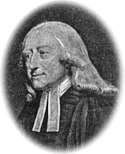- Methodist Church in India
-
Methodist Church in India 
Classification Protestant (Methodist) Associations World Council of Churches, Christian Conference of Asia, the National Council of Churches in India and World Methodist Council Congregations 2,460 Members 648,000 Part of a series on
Methodism
John Wesley Background Doctrines Key people - John Wesley
- Richard Allen
- Francis Asbury
- Thomas Coke
- William Law
- William Williams Pantycelyn
- Howell Harris
- Albert Outler
- James Varick
- Charles Wesley
- George Whitefield
- Countess of Huntingdon
- Bishops · Theologians
Largest groups Related groups Other topics - Connexionalism
- Saints in Methodism
- Homosexuality and Methodism
Methodism portal Methodist Church in India is a Methodist Christian denomination of India. Its seat is in Mumbai.[1] The Church of South India and the Church of North India are the results of mergers involving Methodist Churches. It has hundreds of thousands of members.[2] It is a member of the World Council of Churches, Christian Conference of Asia, the National Council of Churches in India and World Methodist Council.[2] It runs schools.[2]
The Methodist Church in India (MCI), is an "autonomous affiliated" Church in relation to the United Methodist Church.[3][4]
Contents
History
In 1856, the Methodist Episcopal Church From America started mission in India. The Methodist Episcopal Church began its work in India in 1856, when William Butler came from America. He selected Oudh and Rohilkhand as the field of effort, and being unable to secure a residence at Lucknow, began work at Bareilly. The first War of Independence broke up the work at Bareilly, but in 1858 Lucknow was occupied and Bareilly re-occupied and the work of the Mission started anew.
By the year 1864 the work had grown to such an extent that it was organized under the name of the India Mission Conference. Additional stations were occupied in Oudh, Rohilkhand, Garhwal and Kumaon, and by the year 1876 The Methodist Episcopal Church had established work both along evangelistic and educational lines, that was to furnish the foundation for the largest and most successful Mission of the Church.
Methodist Churches were established in cities such as Mumbai, Kolkata, Chennai, and Banglore. Special revival meetings were held which led the church out of its boundaries and gave it a national status.
The year 1870 is remarkable in Indian Methodism's history not only because of William Taylor’s visit but for another reason as well. It was the year that marked the coming of the first missionaries of the Woman’s foreign Missionary Society of the Methodist Episcopal Church. Two young ladies arrived that year: Isabella Thoburn, to start her wonderful work of education among India’s girls and women; and Clara Swain, to inaugurate our medical work among the women of this land, she being the first lady doctor to undertake such work in Asia. It was fitting that the first missionaries of the Woman’s Foreign Missionary Society should come to India, for Mrs. Lois S. Parker, who with her husband Edwin W. Parker had come to India in 1859 and Mrs. William Butler who had served in India still earlier were the leading spirits in the organization of the Woman’s Society in Boston, U.S.A., in 1869. The growth of the work supported by our Woman’s Division (formerly Woman’s Foreign Missionary Society) has been even more phenomenal than that of our Board of Foreign Missions, and in all lines of missionary endeavour it has met with remarkable success.
Evangelistic work in the villages of northern India resulted the baptism of large numbers of people from the deprived classes. Thus it began the mass movement work, which has brought thousands of converts into the Methodist Church in rural areas.
In 1920 the Methodist Missionary Society was organized to supervise the missionary work in India. In 1930 the Central Conference of southern Asia elected the first national Bishop. Since the Independence of India in 1947 all bishops have been Indian nationals. Missionaries were sent to Borneo in 1956 and to the Fiji islands in 1963.
Since 1928, the MCI was engaged in union negotiations in North India. In 1970 - the Central Conference voted against the plan of union, but dialogue with the Church of North India has been continued.
In 1981 the Methodist Church in India was established as an "autonomous affiliated" church in relation with the united Methodist church. This ushered in a new era for Indian Methodism.
The church is now independent in organization and has adopted its own constitution and book of discipline and articles of faith.
Beliefs
The Methodist Church in India understands itself as the body of Christ in and for the world as part of the Church universal. Its purpose is to understand the love of God as revealed in Jesus Christ, to bear witness of this love to all people and to make them his disciples.
Public Welfare
The MCI runs 102 Boarding schools and 155 Village schools in which over 60,000 children are enrolled. 89 residential hostels provide Christian care for 6,540 boys and girls. The Church also operates 19 College and vocational training institutions, 25 hospitals and health care centres, and many community welfare and development programmes in the country
References
- ^ http://www.nccindia.in/affiliates/memberchurches2.htm
- ^ a b c http://www.oikoumene.org/en/member-churches/regions/asia/india/methodist-church-in-india.html?tx_wecdiscussion[sub]=1
- ^ "The Methodist Church in India: Bangalore Episcopal Area". The United Methodist Church GBGM. http://gbgm-umc.org/global_news/full_article.cfm?articleid=3174. Retrieved 2007–10–18.
- ^ "India Methodists celebrate 150 years of ministry". The United Methodist Church. http://www.umc.org/site/c.gjJTJbMUIuE/b.2213807/k.A1A1/Indias_Methodists_celebrate_150_years_of_ministry.htm. Retrieved 2007–10–18.
See also
Part of a series on Christianity Jesus Christ 
Foundations Bible Theology Apologetics · Baptism · Christology · God · Father · Son · Holy Spirit · History of theology · Mary · Salvation · TrinityHistory and
traditionChurch Fathers · Early Christianity · Constantine · Ecumenical councils · Creeds ·
Missions · East–West Schism · Crusades · Protestant Reformation · ProtestantismDenominations
(List) and
MovementsWestern: Adventist · Anabaptist · Anglican · Baptist · Calvinism · Evangelical · Holiness ·
Independent Catholic · Lutheran · Methodist · Old Catholic · Pentecostal · Quaker · Roman Catholic
Eastern: Eastern Orthodox · Eastern Catholic · Oriental Orthodox (Miaphysite) · Assyrian
Nontrinitarian: Christadelphian · Jehovah's Witness · Latter Day Saint · Oneness Pentecostal · UnitarianTopics Art · Criticism · Ecumenism · Liturgical year · Liturgy · Music · Other religions · Prayer · Sermons · SymbolismCategories:- Christian denominations in India
- Methodism in Asia
- Religious organizations established in 1856
Wikimedia Foundation. 2010.
